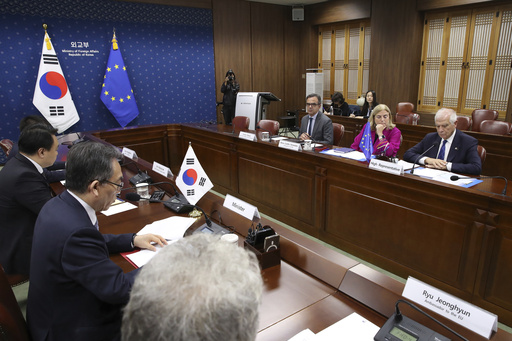
NATO and the European Union are intensifying their initiatives to encourage China to assist in curbing North Korea’s military support for Russia amid the ongoing conflict in Ukraine. Intelligence reports from the United States, South Korea, and Ukraine indicate that as many as 12,000 North Korean soldiers have been deployed to Russia’s Kursk region to aid in combating Ukrainian troops. In return for this support, NATO suggests that Russia is providing missile technology to North Korea.
As Russia continues to leverage its military strength in the Ukraine conflict, the United States is urging its allies to apply political pressure on China to intervene and control North Korea’s actions. The relationship between North Korea and China, established since diplomatic ties were formed in 1949, is often described as “as close as lips and teeth.”
A potential strategy to influence China involves signaling the possibility of increased Western military activities in the Asia-Pacific region. Recently, the European Union finalized new security agreements with key regional partners, Japan and South Korea, strengthening their collaborative defense initiatives.
NATO Secretary-General Mark Rutte weighed in on the situation in an opinion piece, asserting that “China bears particular responsibility here, to use its influence in Pyongyang and Moscow to ensure they cease these actions.” He criticized Beijing for not actively promoting peace while ignoring North Korea’s increasing militarism.
During his visit to Latvia, Rutte specifically highlighted the threat posed by the exchange of missile technologies, deeming it a “direct threat, not only to Europe, but also to Japan, South Korea, and the U.S. mainland.” It is also noted that nations such as Japan, South Korea, Australia, and New Zealand regularly participate in NATO discussions.
Following discussions with U.S. Secretary of State Antony Blinken, Rutte emphasized the necessity of viewing Europe and the Indo-Pacific as a unified strategic theater rather than two separate entities. He remarked, “our security, therefore, now more and more is global, and we have to look at this as a global issue.”
Although the alliance between North Korea and Russia is growing stronger, analysts have observed that China appears hesitant to engage in a trilateral anti-West coalition, favoring stability in its security landscape to address economic hurdles and sustain ties with European and Asian countries.
In a recent blog post, EU foreign policy chief Josep Borrell shared insights from his recent visit to Japan and South Korea, during which the subject of North Korea’s military contributions to Russia was a significant topic of discussion. He termed the situation “an escalation of the utmost seriousness,” which was central to his discussions with leaders from Japan and South Korea.
Furthermore, Borrell announced the establishment of new security partnerships with Japan and South Korea during his visit, outlining these as the first collaborations of their kind outside Europe. He stated, “The EU was certainly not born as a military alliance but, in the current geopolitical context, it can and must also become a global security provider and partner.”
This week, Blinken reiterated the Biden administration’s commitment to ensuring continued support for Ukraine, especially as it faces a full-scale invasion next year. The administration’s goal is to provide extensive assistance to help Ukraine maintain its defenses against Russian aggression and to bolster its position in any potential peace negotiations.
